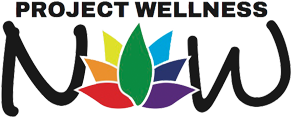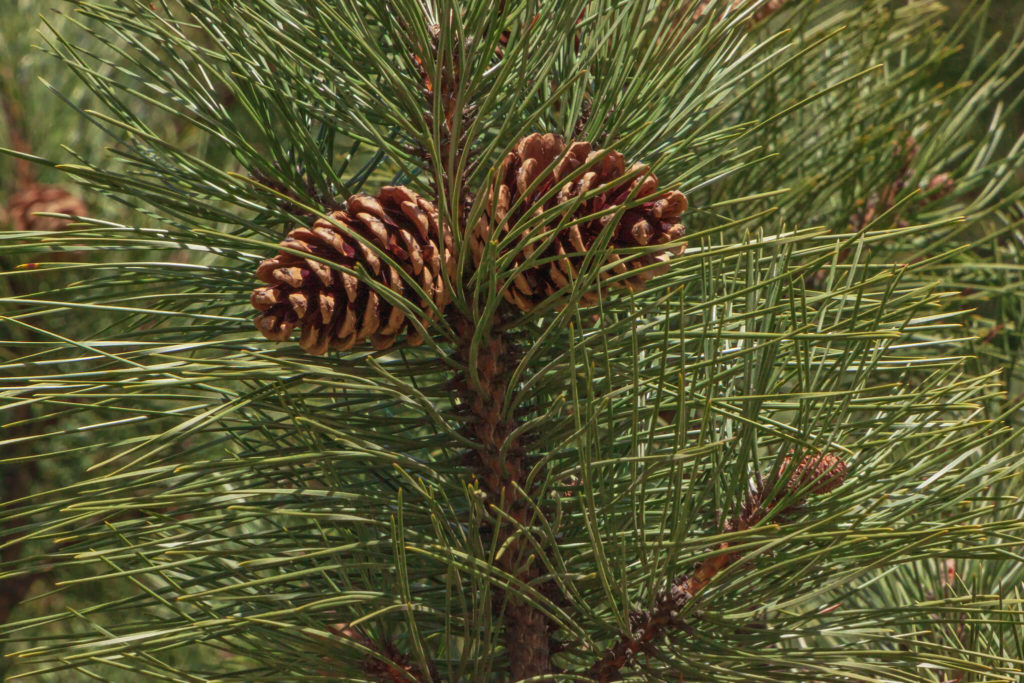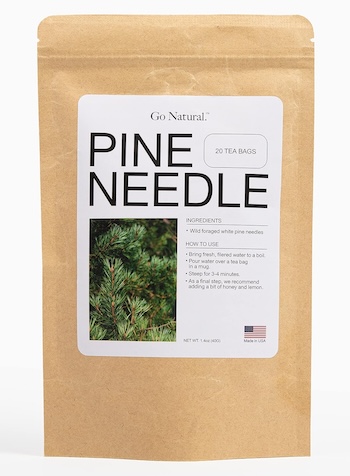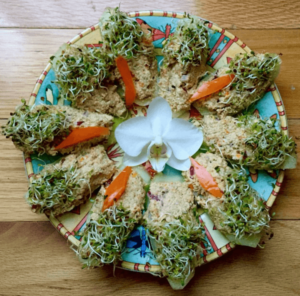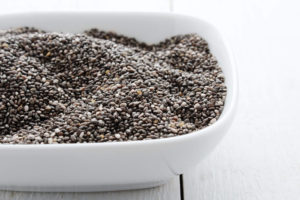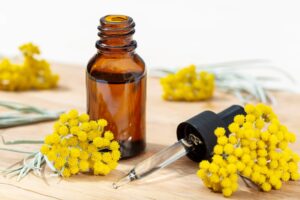Forests are a delight to the senses, and pine trees, in particular, have a pristine, fresh quality to them. A piping hot brew of pine needle tea offers a citrusy and minty flavor and a load of health-boosting antioxidants. The bark, cones, and needles of pine trees have been part of traditional Native American medicine for centuries.
How Is Pine Needle Tea Brewed?
Pine needle tea is brewed by steeping fresh pine needles from white or red pine trees in hot water. Whereas boiling can destroy the antioxidants and other nutrients in the needles, steeping them for around 10 minutes preserves their therapeutic qualities.
The older the pine needles are, the more nutrients they offer. Older needles have a bitter flavor, which can be easily offset with added sweeteners. Younger pine needles, on the other hand, offer a naturally sweet citrus flavor with a hint of minty spice.
PINE NEEDLE TEA’S PROVEN HEALTH BENEFITS
This amazing tea is good for inflammation, hypertension, stress, cognitive function, and a bogged-down immune system. Researchers have worked to connect the health benefits of pine needles with the various bioactive compounds inside them.
According to the scientific literature, here are six proven benefits of this natural medicine:
1. Gives You a Medicinal Dose of Vitamin C
When French sailors arrived in the Americas, native people offered white pine needle tea to treat their ailments. The explorers experienced radical transformations because they were suffering from scurvy — a disease caused by an extreme deficiency in vitamin C.
White pine needles harvested after just one year provide twice the vitamin C as oranges. Harvested after two years, the same needles will provide 3.5 times the vitamin C found in oranges [1].
Vitamin C is an antioxidant that has been widely studied for its protective benefits, including eye health, heart health, and immune function. Taking 1 to 2 grams of vitamin C daily has been linked to less severe colds and bouts of influenza [2]. According to research from the USDA and the U.S. Forest Service, white pine needles can have between 0.72 mg and 1.87 mg of vitamin C per gram [3].
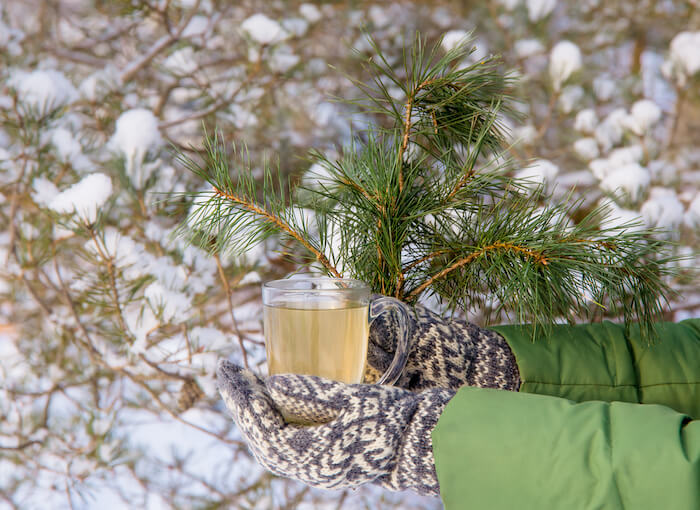
2. Lowers Inflammation
According to a research paper published in Antioxidants, the flavonoids in pine needles responsible for their green color provide anti-inflammatory effects [4]. When given to mice with swollen ear canals, pine needle extract reversed the inflammation [5].
Exposure to industrial pollutants, tobacco products, excessive alcohol, and even long-term stress can all lead to chronic inflammation. Chronic inflammation can play a role in developing several chronic diseases, including heart disease, cancer, and more [6]. Thankfully, anti-inflammatory compounds are found abundantly in nature, and pine needle tea is an excellent source.
3. Supports Cardiovascular Health
Pine needle tea is a vasorelaxant, which means it helps blood vessels dilate so you can maintain optimal blood pressure. An amino acid called arginine is found abundantly in pine needle tea, and it works together with vitamin C to soften artery walls and allow blood to flow more freely. The benefits of pine for patients with high blood pressure have been established by scientific research and even inspired the pharmaceutical drug Pycnogenol® [7].
Another way this tea improves heart health is through its potent antioxidant effects. Numerous antioxidant compounds in pine needles, including various flavonoids, acids, and vitamins, can neutralize free radicals in the body. Free radicals build up from air pollution, radiation, and the body’s normal metabolic processes. While the body produces some antioxidants naturally, their numbers decline as you age. Without enough antioxidants to neutralize free radicals, your body goes into a state of oxidative stress — a condition that elevates your risk for heart disease. On the other hand, a diet rich in antioxidants is linked to a lower risk for cardiovascular disease [8].
4. May Help Prevent Cancer
According to research published in Nutrition and Cancer, pine needles produce not just antioxidant effects but also antimutagenic and antiproliferative effects on cancer cells [9]. Pine needle extract was found to stop the propagation of human breast cancer cells in test tubes [10]. Another test-tube study found that pine needle powder inhibited human cervical cancer cells [11]. While human studies are needed, lab evidence suggests that drinking pine needle tea could have cancer-preventative benefits.
5. Slows the Brain’s Aging
Based on research on mice, scientists think pine needles could help patients with Parkinson’s, Alzheimer’s, and other types of dementia [12]. When pine was given to senile mice, they exhibited reverses in memory and learning deficits [13].
Pine needle tea works in a similar way to acetylcholinesterase inhibitors, which are drugs for treating cognitive impairments caused by age-related neurodegenerative diseases. No human trials have been done to date, but the medicinal qualities of pine needle tea could potentially help slow the brain’s natural aging process.
6. Relieves Stress and Anxiety
Just like this tea could help an aging brain, it could also help a brain experiencing high levels of stress. It works by regulating the brain’s hippocampus region to prevent excessive amounts of the stress hormone cortisol. High cortisol levels, left unchecked, can reduce cognitive function and cause anxiety. On the other hand, intervention with pine needle extract has been shown in animal models to improve memory and cognitive performance in the face of stress. In fact, pine needles were historically used in Chinese Traditional Medicine to improve mental health disorders [14].
White Pine Needle Tea vs. Other Pine
White pine needles are said to be the best-tasting kind and are the most common type available for purchase. However, red pine, longleaf pine, and several other species are both edible and beneficial. The species of pine to avoid are ponderosa pine, lodgepole pine, and Norfolk pine, as they’re toxic when consumed [15].
Safety Precautions for Drinking Pine Needle Tea
Any plant you haven’t tried before could potentially be an allergen. If you have any adverse reaction from pine needle tea, you could be allergic and should discontinue drinking it. Other than that, this herbal tea is very safe to drink. Still, consuming excessive amounts could cause side effects because pine needle tea has a mild diuretic effect.
If you’re taking any prescription diuretics, ask your doctor if it’s safe for you to try pine needle tea. Pregnant women should avoid pine needle tea because it can potentially cause miscarriage [15].
Pine needle tea packs a nutritional punch and even protects against disease. It lowers inflammation, counters the effects of stress, and gives your immune system a boost. With such a wide range of benefits now confirmed by modern research, there’s something for everyone in a cup of pine needle tea.
References:
1. wildedible.com/pine-needle-tea-natural-vitamin-c
2. ncbi.nlm.nih.gov/pmc/articles/PMC6124957/
3. srs.fs.usda.gov/pubs/3462
4. ncbi.nlm.nih.gov/pmc/articles/PMC8069155/
5.researchgate.net/publication/361257415_Extract_of_Pinus_densiflora_needles_suppresses_acute_inflammation_by_regulating_inflammatory_mediators_in_RAW2647_macrophages_and_mice
6. health.harvard.edu/staying-healthy/understanding-acute-and-chronic-inflammation
7. ncbi.nlm.nih.gov/pmc/articles/PMC6017640/
8. my.clevelandclinic.org/health/articles/16739-antioxidants–heart-health
9. pubmed.ncbi.nlm.nih.gov/17474862/
10. ncbi.nlm.nih.gov/pmc/articles/PMC4653339/
11. ncbi.nlm.nih.gov/pmc/articles/PMC4962484/
12. ncbi.nlm.nih.gov/pmc/articles/PMC4431316/
13. pubmed.ncbi.nlm.nih.gov/9817994/
14. pubmed.ncbi.nlm.nih.gov/28642096/
15. offthegridnews.com/alternative-health/the-miracle-pine-tree-medicine-the-native-americans-drank/
YOU MAY ALSO LIKE:
RAW SUNFLOWER SPREAD
Some consider sunflower seeds to be one of the world’s healthiest foods. A handful will supply you with significant amounts of…
COULD AN ACUPRESSURE MAT IMPROVE YOUR HEALTH AND WELL-BEING?
The ancient practice of acupuncture is firmly established as a healing and wellness therapy. It works on the theory that by…
CHIA – SUPERFOOD OF THE AZTEC WARRIORS
Chia seeds have served as a prominent dietary staple for many cultures for hundreds of years. The Aztec Warriors used to…
5 WAYS TO BE KINDER TO YOURSELF IN 2023
With the new year underway, many of us are looking forward to fresh starts and new resolutions. While most people focus…
KAPHA BALANCING FOODS
To balance Kapha, it is important to rise early in the morning, before 6 a.m., and engage in gentle exercise for…
AMAZING BENEFITS OF HELICHRYSUM ESSENTIAL OIL
In the realm of natural health and wellness, essential oils hold a revered place for their vast benefits and therapeutic properties….
